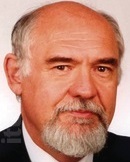
Plenary Lecture
Augmented Virtuality for Next Generation Machine Intelligence

Professor Imre J. Rudas
Óbuda University
Hungary
E-mail: rudas@uni-obuda.hu
Abstract: Several compelling IT trends of the past few years show us how the next possible paradigm change in business intelligence could remodel everything in production informatics. Along the example of Virtual Reality and a community-based granulated software ecosystem, namely the Node.js world and its interference with the System of Systems and Internet of Anything concepts, the presentation will uncover a really powerful future of Industrial software systems.
Evolution of the Node.js world started back in 2008, when Google released the powerful V8 JavaScript engine and Ryan Dahl began using it as a general purpose virtual machine allowing millions of JS developers to create server-side or practically any computer applications for all purposes using common web technologies. Thanks to many beneficial conjunctions like the GitHub and Npm communities as well as the Node friendly PaaS (e.g., MS Azure, Google Cloud, IBM Bluemix, Heroku) today Node.js –based technologies aspire to be a common language of large-scale distributed Internet of Anything systems considering the non mission critical layers.
Our research team investigates new ideas to connect distributed Industrial system elements (sensors, actuators, control logic, intelligent machines, data logging and data mining) to each other and represents them in a Virtual World forming a general purpose information pool which allows for large-scale heterogeneous production systems.
The last part of the presentation summarizes the results and ideas of a newly developed software engine, called MAXWHERE that provides effective working environments with spatial (Virtual Reality) multimedia arrangement and Intelligent System of Systems connectivity.
The fundamental idea behind MAXWHERE is the generalization of the Document Object Model (DOM) introducing the Where Object Model (WOM) concept that covers the conventional WEB contents as well as the VR/AR building blocks in a coherent way empowered by the newest generation web APIs.
Typical applications of MAXWHERE includes industrial monitoring and facility support, context-based collaborative working environment, industrial training, and Interactive live presentations.
Brief Biography of the Speaker: Imre J. Rudas graduated from Bánki Donát Polytechnic, Budapest in 1971, received the Master Degree in Mathematics from the Eötvös Loránd University, Budapest, the Ph.D. in Robotics from the Hungarian Academy of Sciences in 1987, while the Doctor of Science degree from the Hungarian Academy of Sciences in 2004. He received Doctor Honoris Causa degree from the Technical University of Košice, Slovakia, from “Polytechnica” University of Timisoara, Romania, from Óbuda University, and from Slovak University of Technology in Bratislava. He was awarded by the Honorary Professor title of Wroclaw University of Technology in 2013. He is active as a full university professor. He served as the President of Budapest Tech from 2003 till 2010. He was the founder of Óbuda University, the successor of Budapest Tec and was elected as the first President in the period 2010-2014. He served as the President of the Hungarian Rector’s Conference and member of European University Association in 2008. Now he is the Head of the Steering Committee of the University Research and Innovation Center. He has been the president of the Central European Living Lab for Intelligent Robotics since 2014. He is a Fellow of IEEE, Senior AdCom member of Industrial Electronics Society (IES), he served IES as a Vice-President in 2000-2001. He was elected as the Vice-President for Membership and Student Activities in IEEE System, Man and Cybernetics Society for the period 2015-2016. He is the Senior Past Chair of IEEE Hungary Section. He served IFSA (International Fuzzy System Association) as Vice-President and Treasurer for a period of 7 years; he had been the President of Hungarian Fuzzy Association for ten years. He had been the Vice-President of the Hungarian Academy of Engineers for four years. He serves as an associate editor of some scientific journals, including IEEE Transactions on Industrial Electronics, member of editorial board of Journal of Advanced Computational Intelligence, Editor-in-Chief of Acta Polytechnica Hungarica, member of various national and international scientific committees. He is the founder of the IEEE International Conference Series on Intelligent Engineering Systems (INES), IEEE International Conference on Computational Cybernetics (ICCC), IEEE International Symposium on Computational Intelligence and Informatics (CINTI, since 2000), IEEE International Symposium on Machine Intelligence and Informatics (SAMI, since 2003), IEEE International Symposium on Intelligent Systems and Informatics (SISY, since 2003), IEEE International Symposium on Applied Computational Intelligence and Informatics (SACI, since 2004), IEEE International Symposium on Logistics and Industrial Informatics (LINDI, since 2007). He has served as General Chair and Program Chair of numerous scientific international conferences. His present areas of research activities are Computational Cybernetics, Robotics, Cloud Robotics, Internet of Anything, Soft Computing, Fuzzy Control and Fuzzy Sets. He has edited and/or published 22 three books, published more than 800 papers in international scientific journal, conference proceedings and book chapters, and received more than 2500 citations.